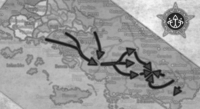Shiro-Lach Conflict: Difference between revisions
mNo edit summary |
mNo edit summary |
||
| Line 1: | Line 1: | ||
The '''{{PAGENAME}}''' (1665–) had its origins in the [[Laqi Free Republic|unsuccessful secession]] of [[shire:Modan-lach|Lachmodan]] from the [[Shireroth|Imperial Republic]] and the travails of the [[shire:Karalakh|Karalakh]] (Black Laq) in the service of [[Minarboria|Lichdom]]. | The '''{{PAGENAME}}''' (1665–) had its origins in the [[Laqi Free Republic|unsuccessful secession]] of [[shire:Modan-lach|Lachmodan]] from the [[Shireroth|Imperial Republic]] and the travails of the [[shire:Karalakh|Karalakh]] (Black Laq) in the service of [[Minarboria|Lichdom]]. This legacy of separatism would be amplified by the successes of the Inner Benacians in establishing their own polity and would result in the Shirerithians making a determined effort to bring their wayward small neighbour to heel. | ||
Revision as of 22:33, 1 November 2018
The Shiro-Lach Conflict (1665–) had its origins in the unsuccessful secession of Lachmodan from the Imperial Republic and the travails of the Karalakh (Black Laq) in the service of Lichdom. This legacy of separatism would be amplified by the successes of the Inner Benacians in establishing their own polity and would result in the Shirerithians making a determined effort to bring their wayward small neighbour to heel.
Fresh discontent
Northern Lachmodan, the heartland of the old Khanate of Karalakh was rife with rumours that the Imperial Mother was conspiring with the Sibyl of Bifrons to snatch the sacred Helm of Nela Khan Karalakhli from the Kurpla Fortress where it had been guarded by diligent monks since the crumbling of Lichdom to form a part of the coronation regalia for her son the Kaiser as he finally transitioned into adulthood and assumed the mantle of sovereign lord over the Benacian empire. It was rumoured this was all part of a plot to regain favour at court after a rash attempt to preempt the emancipation of the unfree by ordering a genocidal assault on the Froyalanish population had earned a stern rebuke from the Steward.
What would go on to contribute greatly to the headache that the Lach question would become for the Imperial Republic was the measure of support that dissidents within the Imperial Republic would be able to receive from Shireroth's near aboard.
The Republic of Inner Benacia had been a problem for Shireroth for some time. Unlike the technologically and militarily formidable Kalgachi nation, the tribal confederacy which had gathered around the Dolmen in Stonetree had excited Shirerithian contempt from the very moment of its inception. In spite of this the success of the Inner Benacians in forming a multi-ethnic coalition to survive repeated Shirerithian incursions into the green, as well as holding their own in minor stand-offs with Kalgachia and Kasterburg, had excited nationalist sentiment amongst the Lach, Yehudi, and Tellian communities of Southern Benacia. The disparate ethnic groups, finding themselves under Imperial rule in Modan, Siyacha, and the Tellian Mandate, had already some experience of collective political action in the form of Coalition 1660, which had helped shake off Malarborian rule. However, by the time of the fractious Folksraad Election of 1665, support for the constitutional democratic route for securing autonomy was starting to ebb away in favour of a militant campaign to achieve full independence.
Dawn Over Karamakhi
One of the inciting factors contributing to the atmosphere of greater militancy came in 1664, on account of the activities of separatists operating in Inner Benacian territory with a measure of collusion from the authorities there. "Dawn Over Karamakhi" was the opening line of a verse of Laqi poetry made famous by the poet Medi Hadjimehmetov (nephew of the infamous secessionist Count of Lywind). The line was recited as an opening in a broadcast by a pirate radio station located in Inner Benacia on the 1st hour, of the first day, of the first month, of 1664. The effect of the broadcast was incendiary as it alluded to the final line of the same poem, which ended with "Our Liberty, Our Joy" (Enxu Estәkla, Enxu radsta), a historic call to arms amongst the Laqi.
